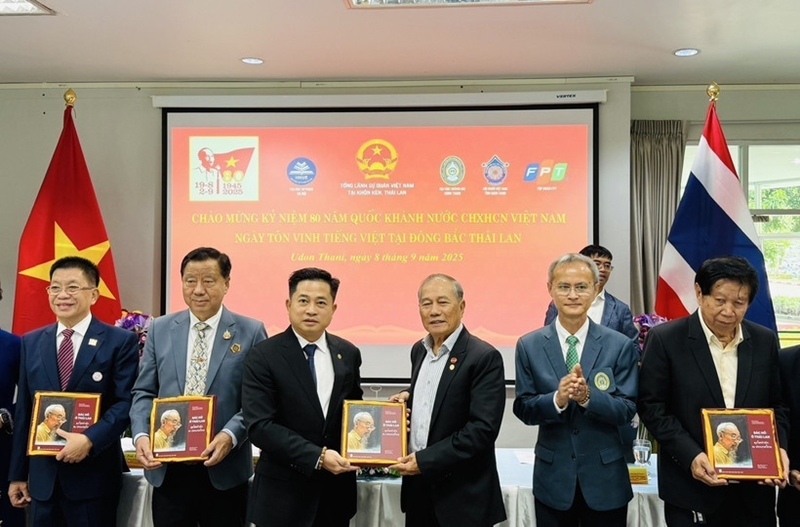The event, held at Udon Thani Rajabhat University, gathered educators, linguists, cultural experts, leaders of Vietnamese associations, Thai-Vietnamese organizations, overseas Vietnamese, and friends from both countries. It was also connected online with various locations in Vietnam, the Vietnamese Embassy in Bangkok, and the Consulate General in Fukuoka, Japan.
    |
 |
|
Overseas Vietnamese receive bilingual book “President Ho Chi Minh in Thailand.” |
In his opening speech, Consul General Dinh Hoang Linh recalled that nearly a century ago, during his revolutionary activities in Thailand, President Ho Chi Minh opened the first Vietnamese class for the expatriate community in Udon Thani, laying the foundation for Vietnamese language learning in the region. He stressed that preserving the mother tongue and culture has become a valued tradition passed down through generations of Vietnamese in Thailand.
Dr. Viboon Pensuk, Vice Rector of Udon Thani Rajabhat University, said the Vietnam Studies Center’s growing role is an important bridge in educational, cultural, and academic ties between Thailand and Vietnam. The center has organized Vietnamese language training, exchange programs, internships, and cultural activities with universities in Vietnam. For 2026, it aims to develop a data hub, publish bilingual learning materials, and become a model Vietnam studies institution not only in Thailand but also across ASEAN.
Hoang Thi Lai, Vice Chairwoman of the Vietnamese Association in Nong Khai province, said after receiving training in Vietnam, she has worked with the local Vietnamese association to run Vietnamese language classes at weekend for children of overseas Vietnamese families.
On the occasion, the Consulate General also held a conference reviewing Vietnamese language teaching in 2025 and mapping out directions for 2026, while launching the first advanced training program for overseas Vietnamese teachers and volunteers in Northeast Thailand. The initiative is expected to strengthen teaching capacity, promote the study and use of Vietnamese, and further improve language education quality in Thailand.
Source: VNA